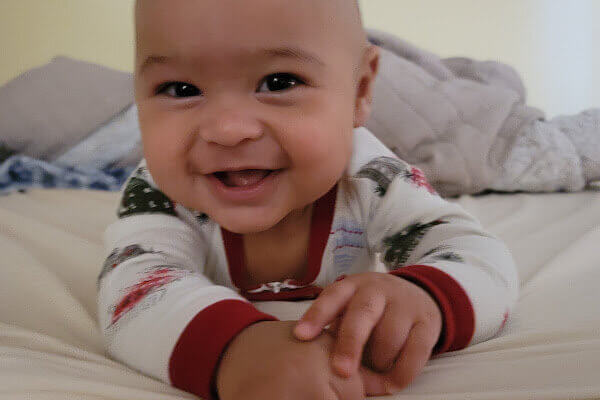Who needs an alarm clock when your baby wakes up at the crack of dawn? “Early rising is a common problem for babies and toddlers—and even some preschoolers,” says Kim West, LCSW-C, aka The Sleep Lady. “Once a baby is sleeping through the night and no longer needs a middle-of-the-night feeding (usually around 6-8 months), then the average wakeup range should be between 6:00 A.M. and 7:30 A.M. If it’s still dark out, then it’s probably too early.”
And while 10 to 15 percent of kids are natural early birds, most are getting up too soon for outside reasons. “If your child is getting tired and cranky well before naptime, then he’s waking too early,” says West. “Luckily, this is usually an easy fix, once you’ve identified the problem.”
Here’s what to do if your baby wakes up too early!
Be a sleep detective
First, see if there’s an outside source that’s causing your baby to wake up early, such as birds chirping right outside her window or too much light streaming through from a streetlamp, etc. “Set your alarm to wake you up 10 minutes before baby normally wakes up,” says Rebecca Welton, a child sleep practitioner and author of Baby Sleeping Trust Techniques. If the main culprit is noise, a white noise machine can help drown out any outside commotion, while room darkening blinds can keep light out.
Try an earlier bedtime
It’s counterintuitive, but often a child will sleep in later in the morning if they go to bed earlier at night, says Jenn Kelner, a certified infant and sleep consultant with BabyZzz. “One of the main reasons children wake early is because they are overtired. Simply move your child’s bedtime 20 minutes earlier. If there is some improvement, continue moving the bedtime earlier until the ideal wake-up time is reached.”
Don’t forget about naptime
Many parents think if they cut down (or cut out) nap times, baby will sleep better at night. Not so, says West. “Babies who take short naps—or finish all of their naps early in the day—tend to have trouble sleeping at night, which can lead to early rising.”
Use an alarm clock
For toddlers who wake up too early, try an alarm clock. (We like the OK to Wake! clock color-changing night-light timer) designed for tots 18 months and older, “these give toddlers and children a visual aid in knowing when it’s night time and when they can get up for the day,” says Welton. “The clock, combined with praise for your toddler and perhaps a sticker chart reward system for when they do stay in bed until the clock changes, can be very effective.”
Set the expectation
Try not to engage with your child on mornings when they wake early, says Kelner. If your child is in a crib, leave her to amuse herself until an appropriate wake up time to send the message that it’s not time to get up, and also give them the opportunity to go back to sleep on their own.




